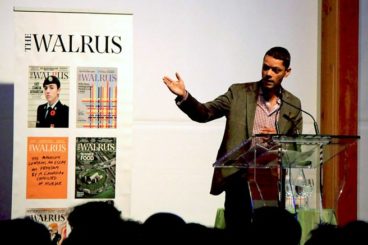Roberta Bondar, Jamie Kennedy and seven others discuss The Art of the City at the latest Walrus Talk

Last week at the AGO, the Walrus Foundation convened nine prominent Torontonians—Midnight’s Children director Deepha Mehta, CBC’s Matt Galloway, chef Jamie Kennedy and astronaut Roberta Bondar among them—and gave them each seven minutes to talk about one aspect of “the art of the city.” The result: nine little TED talks, more or less, about different aspects of Toronto in 2012. Some were funny, some were profound, and yes, some were a little pedantic. Here’s how it all went down:
1. Shawn Micallef, editor, Spacing, on the art of history
The message: Without the burden of history, Toronto is at liberty to define itself.
The delivery: The quippy journalist was given the tough job of going first but led things off with aplomb, taking a few well-timed swipes at politicians. He made his case by pointing to the city’s history with Fort York: the nation-founding battle site now lies in the shadow of expressways and condos, and narrowly evaded being moved for the construction of the Gardiner. It’s since become both the nation’s most illustrious receptacle of canine excretions (i.e., a popular dog park). In other words: Toronto is still learning to live with its history.
2. Don Schmitt, architect, Diamond and Schmitt, on the art of architecture
The message: Architecture is about injecting art into a city.
The delivery: Schmitt clearly likes to use images of things spreading out and connecting: terms like “fabric,” “network” and “root system” came up a lot. He used a pretty slideshow to show the process of how the big, splashy art centres around town only work because of the small experimental artists who are continually working and growing until they’re ready to perform in them.
3. Jennifer Keesmaat, Toronto’s chief planner on the art of neighbourhoods
The message: Make the city your own; own the city.
The delivery: Keesmat’s talk, with her accompanying PowerPoint presentation, bore the faint whiff of a staff presentation at city council. Although she started with buzzwords and planner jargon, she did a good job of turning things around. At heart, she argued, her real job is to help make Toronto’s neighbourhoods more vibrant and people-centric.
4. Dionne Brand, Toronto’s poet laureate on the art of language
The message: Each of us interprets our own city.
The delivery: Brand spoke in verse and had the whole room mesmerized. We don’t have the text in front of us, but we’ll give it the old third-year poetry seminar try: the poem was a conversation between the idealistic self and the practical self that followed the interactions of an ordinary day. Brand spoke of taxi rides and butcher shops and reflected on how this internal dialogue informs each person’s experience of the city.
5. Deepa Mehta, director of Water and Midnight’s Children, on the art of performance
The message: Spontaneity is more revealing than polish.
The delivery: Mehta gave the lucky room of literary types an acting master class. After years of traditional rehearsal, polishing actors’ lines until she knew what to expect on film, Mehta was introduced to an ancient Sanskrit dramaturgy text, the Natya Shastra. It divides the human experience into nine emotions—love, compassion, humour, bravery, peace, fear, repulsion, anger and, Mehta’s favourite, wonderment. Mehta’s new method: learn the story, learn the lines and then apply the emotions, until you hit the right note.
6. Matt Galloway, host of CBC Radio’s Metro Morning, on the art of inclusion
The message: “Diversity is the mix, inclusion is what you do with it”—Galloway quoting an unnamed friend.
The delivery: Galloway shattered any self-congratulatory notions Toronto has about being capital-A Accepting. He contrasted photos of the city’s 2010 World Cup celebrations with photos of city council. The latter did not reflect the former. Galloway urged the room to question assumptions about the value of diversity alone without real inclusion, and to reflect on what a truly inclusive city might one day look like.
7. Jamie Kennedy, chef, on the art of gastronomy
The message: It’s all about terroir.
The delivery: “Canadian cuisine is a series of regional cuisines,” said Kennedy. He championed the local food movement on both gastronomical and environmental grounds, arguing that food can be appreciated as so much more than mere fuel or fuss. Urging the crowd to embrace the culture of gastronomy, he explained that a great meal is essentially about bringing people to a point of comfort where they can exchange ideas—like the idea of terroir.
8. Roberta Bondar, astronaut, neurologist, ecologist and photographer, on the art of ecology
The message: Be intimately familiar with your environment.
The delivery: The six-year-old in us was thrilled—to the point of giddiness—when Canada’s first woman in space took the stage. Bondar didn’t disappoint. She showed video from space and shared tales of her extraterrestrial adventures, including how, after being in orbit for two days, she was struck by how much she missed the sound of birds. Now a nature photographer, she urged the crowd to take a closer look at the natural world (she also gave a shout-out to Rouge Park).
9. Kamal Al-Solaylee, undergraduate program director, Ryerson University, on the art of learning
The message: Universities are not job factories.
The delivery: We’ll admit this talk had us a little mystified. It was part tirade against government influence on academia (here here!) and part love letter to Toronto. At the end he said he was sorry if he ended up sounding too much like he was making a grant proposal: “It is a skill that no academic or artist in Toronto can live without.”





